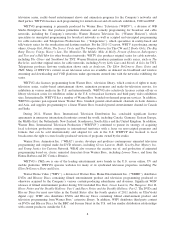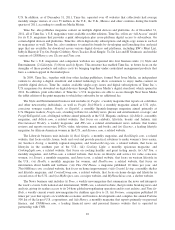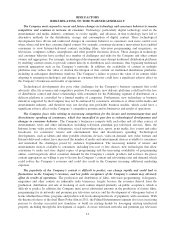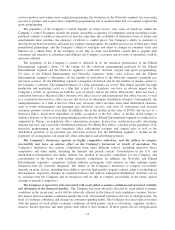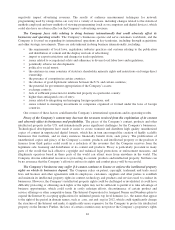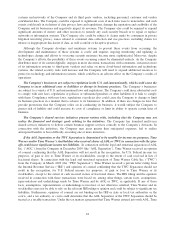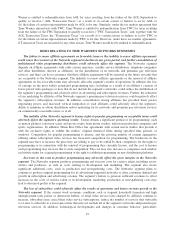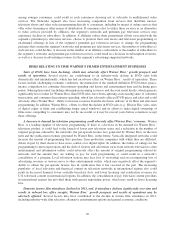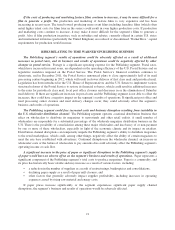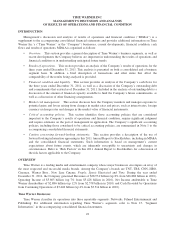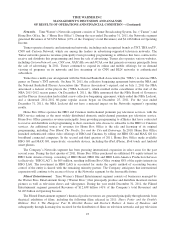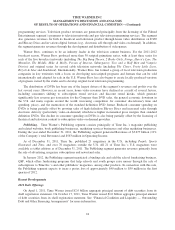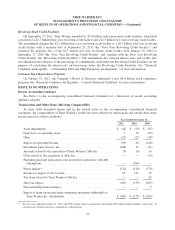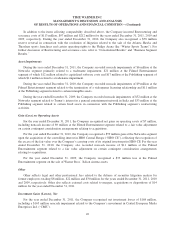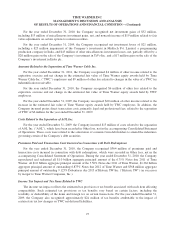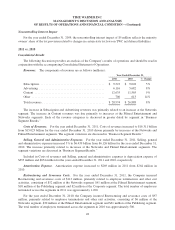Time Magazine 2011 Annual Report Download - page 32
Download and view the complete annual report
Please find page 32 of the 2011 Time Magazine annual report below. You can navigate through the pages in the report by either clicking on the pages listed below, or by using the keyword search tool below to find specific information within the annual report.systems and networks of the Company and its third party vendors, including personnel, customer and vendor
confidential data. The Company could be exposed to significant costs if such risks were to materialize, and such
events could result in violations of data privacy laws and regulations, damage the reputation and credibility of the
Company and its businesses and negatively impact its revenues. The Company also could be required to expend
significant amounts of money and other resources to remedy any such security breach or to repair or replace
networks or information systems. The Company also could be subject to claims made by consumers in private
litigation involving privacy issues related to consumer data collection and use practices, including claims for
misuse or inappropriate disclosure of data, as well as unfair or deceptive practices.
Although the Company develops and maintains systems to prevent these events from occurring, the
development and maintenance of these systems is costly and requires ongoing monitoring and updating as
technologies change and efforts to overcome security measures become more sophisticated. Moreover, despite
the Company’s efforts, the possibility of these events occurring cannot be eliminated entirely. As the Company
distributes more of its content digitally, engages in more electronic transactions with consumers, outsources more
of its information systems to third-party vendors and relies on more cloud-based information and technology
systems, the related security risks will increase and the Company will need to expend additional resources to
protect its technology and information systems, which could have an adverse effect on the Company’s results of
operations.
The Company’s businesses are subject to regulation in the U.S. and internationally, which could cause the
Company to incur additional costs or liabilities or disrupt its business practices. The Company’s businesses
are subject to a variety of U.S. and international laws and regulations. The Company could incur substantial costs
to comply with new laws, regulations or policies or substantial penalties or other liabilities if it fails to comply
with them. Compliance with new laws, regulations or policies also could cause the Company to change or limit
its business practices in a manner that is adverse to its businesses. In addition, if there are changes in laws that
provide protections that the Company relies on in conducting its business, it would subject the Company to
greater risk of liability and could increase its costs of compliance or limit its ability to operate certain lines of
business.
The Company’s shared services initiatives present various risks, including that the Company may not
realize the financial and strategic goals relating to the initiatives. The Company has launched multi-year
shared services initiatives to deliver certain business support services centrally to the Company’s divisions. In
connection with the initiatives, the Company may incur greater than anticipated expenses, fail to realize
anticipated benefits or have difficulty executing one or more initiatives.
If the AOL Separation or the TWC Separation is determined to be taxable for income tax purposes, Time
Warner and/or Time Warner’s stockholders who received shares of AOL or TWC in connection with the spin-
offs could incur significant income tax liabilities. In connection with the legal and structural separation of AOL
Inc. (“AOL”) from the Company in December 2009 (the “AOL Separation”), Time Warner received an opinion
of counsel confirming that the AOL Separation will not result in the recognition, for U.S. Federal income tax
purposes, of gain or loss to Time Warner or its stockholders, except to the extent of cash received in lieu of
fractional shares. In connection with the legal and structural separation of Time Warner Cable Inc. (“TWC”)
from the Company in March 2009 (the “TWC Separation”), Time Warner received a private letter ruling from
the Internal Revenue Service (“IRS”) and opinions of counsel confirming that the TWC Separation should not
result in the recognition, for U.S. Federal income tax purposes, of gain or loss to Time Warner or its
stockholders, except to the extent of cash received in lieu of fractional shares. The IRS ruling and the opinions
received in connection with these transactions were based on, among other things, certain facts, assumptions,
representations and undertakings made by Time Warner and by AOL or TWC, as applicable. If any of these
facts, assumptions, representations or undertakings is incorrect or not otherwise satisfied, Time Warner and its
stockholders may not be able to rely on the relevant IRS ruling or opinion and could be subject to significant tax
liabilities. Furthermore, opinions of counsel are not binding on the IRS or state or local tax authorities or the
courts, and a tax authority or court could determine that the AOL Separation or the TWC Separation should be
treated as a taxable transaction. Under the tax matters agreement that Time Warner entered into with AOL, Time
18


